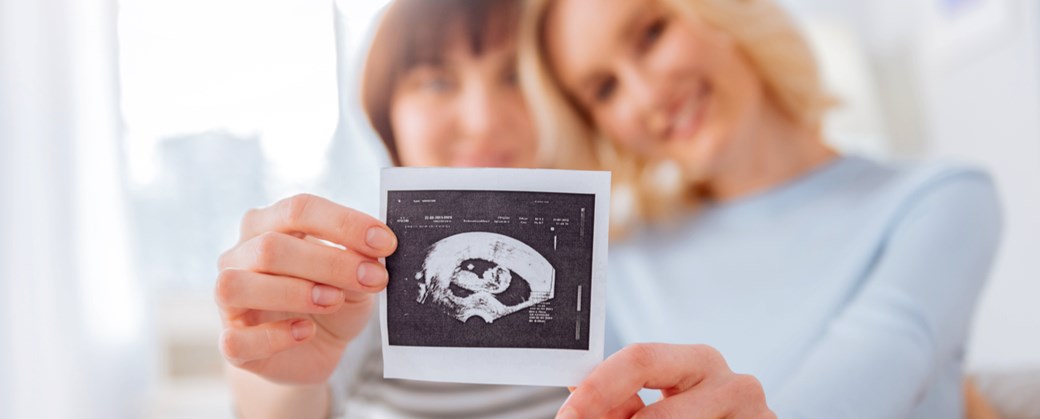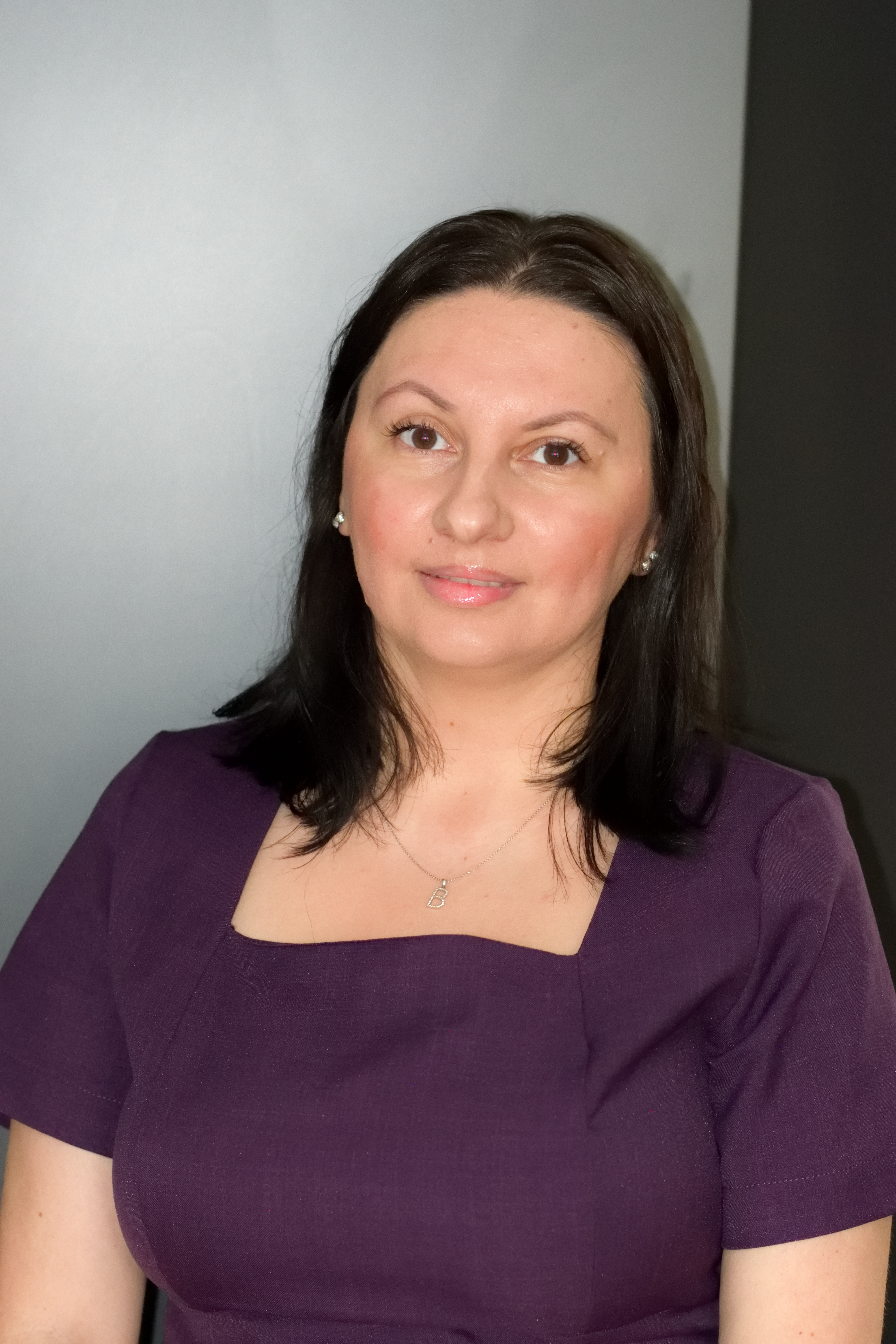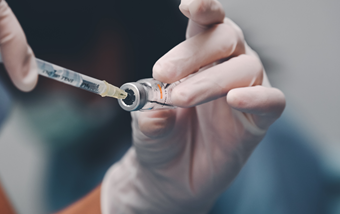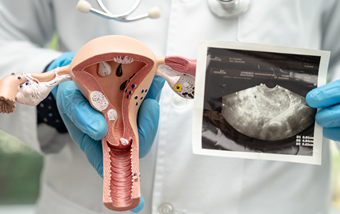What is reciprocal IVF?
Reciprocal IVF, also known as shared motherhood, intra-partner egg donation, partner IVF, co-IVF, ROPA (reception of oocytes from partner) or partner-assisted reproduction was first used in Spain in 2007 at the CEFER Institute, and though still a relatively new treatment, today it is an increasingly popular and widely used option for same-sex female couples seeking to start or grow their family. Over the years we have successfully treated many couples planning their family life together. We know that starting fertility treatment is an exciting time, but also an emotional one, as you grapple with questions about choosing the sperm donor that is a good match for you and your genetic connection to your child.
How reciprocal IVF works
In reciprocal IVF, donor sperm is used, and one cycle of IVF is split between two partners.
One partner in your couple will be the ‘biological parent’ to your baby, which means they will be one who has eggs collected and then donates them to the other partner. The other partner will be the ‘gestational’ or ‘birth parent’, and will have the embryo implanted after fertilisation, and will carry your baby and give birth. When you come to us for your initial consultation we will talk through with you whether reciprocal IVF and shared motherhood is right for your circumstances, and what factors might have a bearing on your decision over who is the biological parent and who is the birth parent.
Choosing a sperm donor
The first decision you will need to make is on choosing a sperm donor. Here at abc ivf we are part of CREATE Fertility, one of Europe’s leading fertility clinics. Through this partnership, we are able to offer our patients the option to choose from a selection of sperm donors. We only work with recognised and licensed donor banks which means you can be confident that all donors are screened to make sure they are healthy, and that you receive high-quality sperm. Many couples look for donors that are a good match in terms of skin, eye and hair colour. You can also find information on donors’ educational background.
In the UK donors remain anonymous, though any child born as a result of the donation will have the right to contact the donor through the clinic, or the NHS once they are 18. Some couples consider private donation – which might for example see a family member of the non-biological parent donate sperm so that they create a genetic connection to the baby. If this is something that you are exploring then we advise that private donors are screened in the same way as any other donor and that the donation procedure takes place through the clinic. You’ll also need to think through how the donor’s relationship with your child will work, and it’s advisable to draw up an agreement to keep this clear. You’ll want to think about how you’ll go on to talk to your child about their conception and who the donor is, and when the time comes there are many organisations and forums you can tune in to for help with this, as well as support from the HFEA.
Who is legally the parent when eggs or sperm are donated?
When you are thinking through all the implications of your treatment you should consider the legalities. As the HFEA explains, if you give birth to a child, you’re automatically their mother and legal parent. If you’re married or in a civil partnership before treatment with donated sperm or embryos begins, your partner will automatically be the legal parent. The situation is different however if you are not married or in a civil partnership with your partner. In this case, you must both consent before treatment to ensure you are both legal parents – this applies in situations where you are in a female same-sex relationship where one partner donates eggs to the other for treatment.
Who is the donor and who is the carrier?
In terms of giving your treatment the best chance of success, there are a few things you need to think about before you begin. If you are going to be the one who donates eggs and becomes the biological parent you will need to confirm that you have a good egg reserve. If you are going to receive the embryo and carry the baby, you will need a healthy uterus. When you begin treatment with us, we will check that you meet the criteria that we use to keep our treatments simple, safe and effective, which means you’ll need to be no older than 39, with a BMI under 32 as well as having a good ovarian reserve.
At this stage, you may want to consider the possibility that if your initial scans and tests indicate that carrying your baby is a possibility for both of you, then the non-birth parent from this cycle could become the birth parent in future treatment cycles, using frozen embryos you retain from your first round of treatment.
The treatment journey
When you come to us to start your shared motherhood journey, the very first step for you both will be our advanced ultrasound scan to assess your fertility, including your egg reserve and how healthy your uterus and ovaries are. This scan will be carried out by one of our fertility nurse consultants in your local abc ivf clinic and will take around half an hour. The scan will be followed by a joint consultation with a fertility nurse consultant to talk through the results of your scans and discuss the best way forward for your treatment. At this point the partner who provides the eggs will be registered as a donor with the HFEA and will need to fill out all the donor paperwork, you’ll also discuss the choices you have made on sperm donation. We will offer you counselling to make sure you both have the chance to talk through how you are feeling about the treatment. This session is followed by a treatment consultation, where our team explains how to administer the medication you need, and does the blood tests you need, and we’ll order the sperm you need if you are sourcing it from our sperm bank.
From here, the journey will be different depending on whether you are donating eggs, or receiving the fertilised embryo.
What happens if you are the partner donating eggs in shared motherhood IVF?
We’ll ask you to call us on day 1 of your cycle to book a scan, and on day 2 you’ll start taking medication. After this, you’ll come into the clinic for scans and blood tests so we can assess how your follicles are growing. At the right point in your cycle, we get you ready for the egg collection procedure, which you will be sedated for to keep you comfortable. Once they are collected, your eggs will then be fertilised with donor sperm, and our embryologists will monitor how the embryos develop, before they are frozen.
What happens if you are the partner receiving an embryo in shared motherhood IVF?
Before you start treatment you will have a consultation with a donor coordinator to discuss the treatment plan with you. On day 1 of your cycle you call us to book in a scan in 7-9 days. From day 2 you’ll begin to take medication to prepare your womb lining, and then between day 7 and 9, you’ll come into the clinic to have a scan to check the development of your womb lining. When your womb is ready, you will begin to use progesterone pessaries. At this point, the best of your frozen embryos will be transferred into your uterus. 10-12 days after the embryo transfer you’ll have a pregnancy test, and then following that if the transfer has been successful, you’ll come into the clinic for a pregnancy scan at 6 weeks of pregnancy.
At abc we use frozen embryo transfer rather than fresh transfer because we carry out egg collection procedures and embryo transfer procedures in time with your cycle. Because we are timing our treatment to your cycle, it’s unlikely that you and your partner’s cycle will match perfectly and allow for fresh embryo transfer.
How can this benefit lesbian couples?
If you are in a same-sex female couple, shared motherhood IVF offers you the chance to both play a part in the creation of your family – an opportunity that was impossible just 15 years ago. With IVF success rates at abc well above the HFEA national average, our team can support you at every step of your journey to parenthood.
At abc ivf, our whole team is dedicated to offering high-quality and successful IVF, at an affordable price. Our treatment packages make working out what you’ll need to spend straightforward and stress-free. Alongside treatment costs, you’ll also need to factor in costs for donor sperm if you are choosing from a sperm bank.
If shared motherhood is an option that you are considering then our team will be happy to talk you through exactly how it works, and whether it might be right for you. Please do get in touch today if you want to ask us anything about our treatments.




